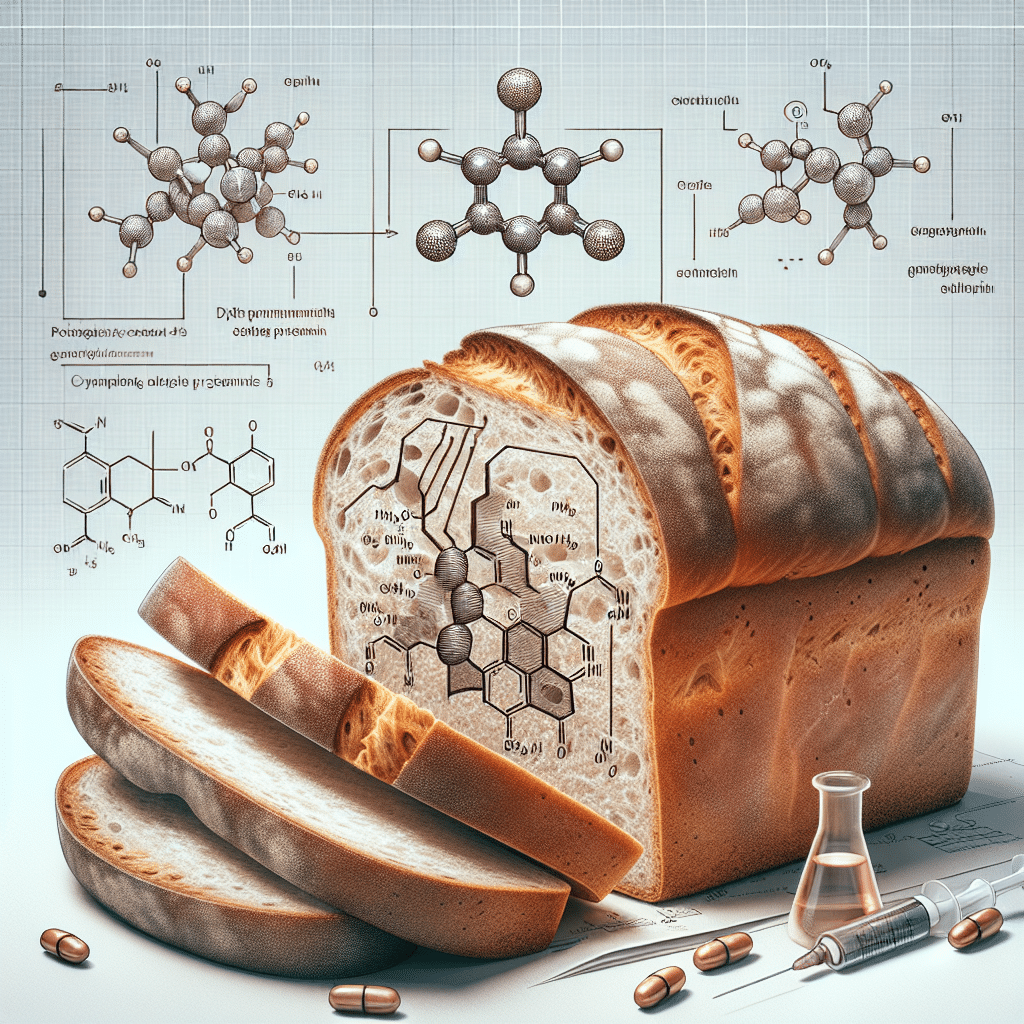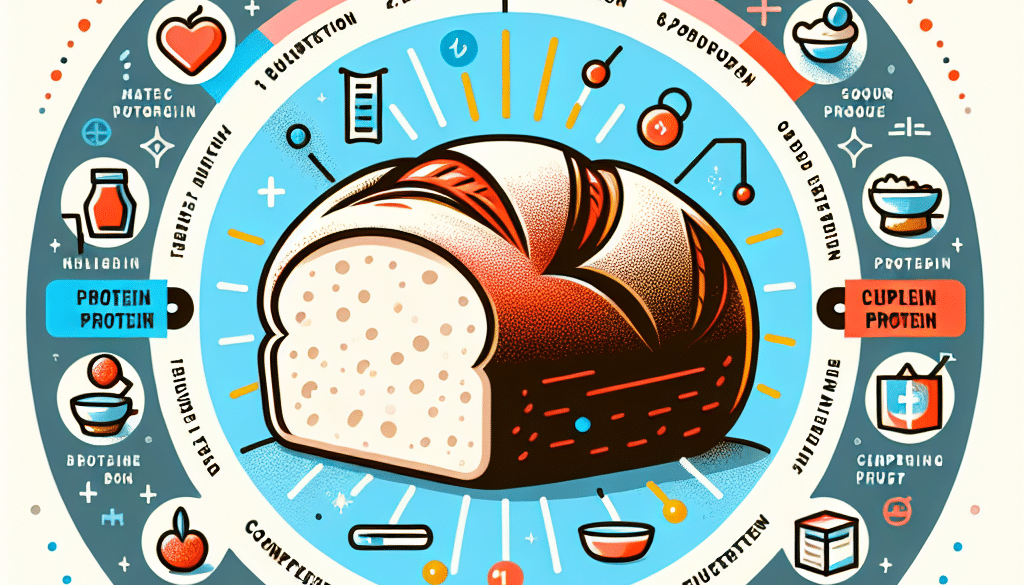Is Sourdough Bread A Complete Protein?
-
Table of Contents
- Sourdough Bread and Complete Proteins: An In-Depth Analysis
- Understanding Complete Proteins
- The Protein Content of Sourdough Bread
- Comparing Sourdough to Other Breads
- Enhancing the Protein Quality of Sourdough Bread
- Case Studies and Research
- Conclusion: Sourdough Bread in a Balanced Diet
- Discover ETprotein’s High-Quality Protein Products
Sourdough Bread and Complete Proteins: An In-Depth Analysis

When it comes to healthy eating, the type of bread you choose can make a significant difference. Sourdough bread, known for its tangy flavor and chewy texture, has gained popularity as a healthier alternative to conventional white or whole wheat bread. But beyond its taste and potential digestive benefits, there’s a question that often arises: Is sourdough bread a complete protein? This article delves into the nutritional profile of sourdough bread, examining its protein content and quality, and how it fits into a balanced diet.
Understanding Complete Proteins
Proteins are made up of amino acids, which are the building blocks of our body’s tissues. There are 20 different amino acids, and nine of these are considered essential because our bodies cannot produce them on their own. A complete protein is one that contains all nine essential amino acids in sufficient quantities.
Most animal-based foods, such as meat, dairy, and eggs, are complete proteins. Plant-based foods, on the other hand, often lack one or more essential amino acids, making them incomplete proteins. However, by combining different plant-based foods, one can obtain all the essential amino acids needed for a healthy diet.
The Protein Content of Sourdough Bread
Sourdough bread is made from a mixture of flour, water, and salt, with the addition of a starter culture that contains wild yeast and lactic acid bacteria. The fermentation process that sourdough undergoes can affect its nutritional content, including its protein quality.
Typically, the protein content in sourdough bread depends on the type of flour used. Whole grain flours will generally have a higher protein content compared to refined flours. However, even with whole grain flour, the protein in sourdough bread is not considered complete because it lacks adequate amounts of certain essential amino acids, particularly lysine.
Comparing Sourdough to Other Breads
When compared to other types of bread, sourdough has a unique fermentation process that can influence its nutritional profile. The lactic acid bacteria present in sourdough can help break down phytates, which are compounds that can bind minerals and reduce their absorption. This process potentially makes the minerals in sourdough bread more bioavailable than those in other types of bread.
Moreover, the fermentation process can also modify the structure of the proteins in the bread, which may affect their digestibility and absorption. However, this does not change the fact that the proteins in sourdough bread are incomplete.
Enhancing the Protein Quality of Sourdough Bread
While sourdough bread alone does not provide a complete protein, it can be part of a diet that collectively meets all amino acid requirements. Here are some ways to enhance the protein quality of a meal that includes sourdough bread:
- Pairing sourdough with protein-rich toppings such as cheese, eggs, or hummus can complement the amino acid profile and create a meal with complete protein.
- Including a variety of plant-based proteins throughout the day, such as beans, lentils, nuts, and seeds, can ensure the intake of all essential amino acids.
- Using sourdough made from a mix of flours, such as wheat and legume flours, can improve the overall protein content and balance of essential amino acids.
Case Studies and Research
Research on sourdough bread’s nutritional aspects has shown that its fermentation process can lead to positive health outcomes. For instance, studies have indicated that sourdough bread may have a lower glycemic index compared to other bread, which can be beneficial for blood sugar management.
However, specific studies focusing on the protein quality of sourdough bread are limited. Most research agrees that while sourdough bread can be part of a healthy diet, it should not be relied upon as a sole source of complete protein.
Conclusion: Sourdough Bread in a Balanced Diet
In conclusion, sourdough bread is not a complete protein as it lacks sufficient amounts of certain essential amino acids. However, it can be included as part of a balanced diet that provides all the necessary nutrients. By combining sourdough with other protein sources or consuming a variety of proteins throughout the day, one can ensure a complete amino acid intake.
The key takeaways from this analysis are:
- Sourdough bread contains protein, but it is not complete due to insufficient levels of certain essential amino acids.
- The fermentation process of sourdough may enhance the bioavailability of certain nutrients.
- Combining sourdough bread with other protein-rich foods can create a meal with complete protein.
- A varied diet is essential to meet all amino acid requirements for those who consume sourdough bread regularly.
Discover ETprotein’s High-Quality Protein Products
If you’re looking to supplement your diet with high-quality proteins, consider exploring ETprotein’s range of organic bulk vegan proteins and L-(+)-Ergothioneine (EGT). Their products are designed to cater to various dietary needs and preferences, ensuring that you can find the right protein solution for your lifestyle.
Whether you’re involved in sports nutrition, weight management, or simply seeking to enhance your overall health and wellness, ETprotein offers a diverse selection of proteins that are non-GMO, allergen-free, and characterized by a neutral taste. Their commitment to purity and quality makes them a trusted choice for consumers worldwide.
For more information on how ETprotein can support your protein needs, contact them and email sales(at)ETprotein.com today.
About ETprotein:
ETprotein, a reputable protein and L-(+)-Ergothioneine (EGT) Chinese factory manufacturer and supplier, is renowned for producing, stocking, exporting, and delivering the highest quality organic bulk vegan proteins and L-(+)-Ergothioneine. They include Organic rice protein, clear rice protein, pea protein, clear pea protein, watermelon seed protein, pumpkin seed protein, sunflower seed protein, mung bean protein, peanut protein, and L-(+)-Ergothioneine EGT Pharmaceutical grade, L-(+)-Ergothioneine EGT food grade, L-(+)-Ergothioneine EGT cosmetic grade, L-(+)-Ergothioneine EGT reference grade and L-(+)-Ergothioneine EGT standard. Their offerings, characterized by a neutral taste, non-GMO, allergen-free attributes, with L-(+)-Ergothioneine purity over 98%, 99%, cater to a diverse range of industries. They serve nutraceutical, pharmaceutical, cosmeceutical, veterinary, as well as food and beverage finished product distributors, traders, and manufacturers across Europe, USA, Canada, Australia, Thailand, Japan, Korea, Brazil, and Chile, among others.
ETprotein specialization includes exporting and delivering tailor-made protein powder and finished nutritional supplements. Their extensive product range covers sectors like Food and Beverage, Sports Nutrition, Weight Management, Dietary Supplements, Health and Wellness Products, and Infant Formula, ensuring comprehensive solutions to meet all your protein needs.
As a trusted company by leading global food and beverage brands and Fortune 500 companies, ETprotein reinforces China’s reputation in the global arena. For more information or to sample their products, please contact them and email sales(at)ETprotein.com today.












